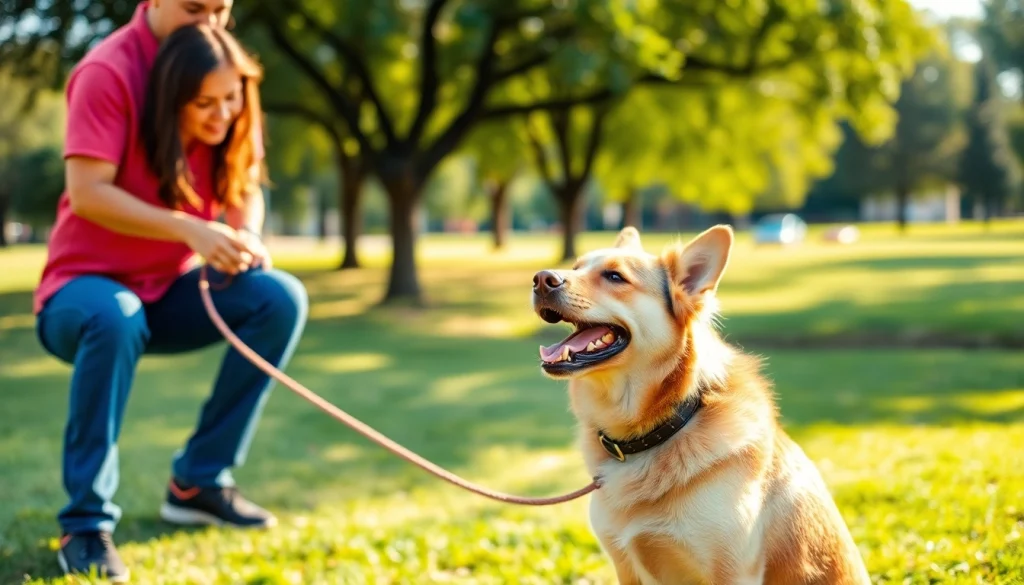Enhance Your Pup’s Skills with the Best Dog Training Houston Offers

Understanding Dog Training Basics
What is Dog Training?
Dog training is the process of teaching a dog specific behaviors, commands, and skills, as well as fostering an understanding between the dog and its owner. This method often involves repetition, positive reinforcement, and consistent communication. Training can range from basic obedience, such as sit and stay, to more advanced skills such as agility and therapy work. The ultimate goal of dog training is to establish a harmonious relationship between the dog and its owner by ensuring that the dog can follow commands and behave in a socially acceptable manner.
Benefits of Dog Training for Pet Owners
Investing time in training your dog is vital for several reasons:
- Enhanced Safety: A well-trained dog is less likely to engage in dangerous behaviors such as running into traffic or showing aggression towards other pets and humans.
- Improved Behavior: Consistent training helps prevent behavioral issues like excessive barking, chewing, and jumping, which can be disruptive for the household.
- Better Communication: Training promotes better communication between you and your dog, making it easier to understand each other’s needs and wishes.
- Stronger Bond: Working together to achieve training goals strengthens the relationship between you and your dog, fostering trust and mutual respect.
Common Dog Training Techniques
Several core techniques are commonly used in dog training. Understanding these can help pet owners select the best approach suited to their dog’s individual personality:
- Positive Reinforcement: This technique rewards the dog for desired behaviors with treats, praise, or playtime, encouraging them to repeat these actions.
- Clicker Training: A form of positive reinforcement that uses a clicker to signal to the dog that they performed the correct behavior, followed by a reward.
- Leash Training: Teaching dogs to walk politely on a leash can prevent pulling and improve control during walks.
- Socialization: Introducing dogs to various environments, people, and other animals helps them adapt and reduces fear or aggression tendencies.
Choosing the Right Training Method
Positive Reinforcement Training Explained
Positive reinforcement training focuses on rewarding good behavior rather than punishing undesirable actions. This technique not only fosters a deeper bond between the dog and owner but also promotes quicker learning. Rewards can vary but typically include treats, praise, or access to engaging activities. Research has shown that this method is more effective and humane compared to traditional punitive methods, making it the preferred approach among modern trainers.
Comparative Analysis of Training Styles
When selecting a training style, it’s essential to consider your dog’s personality as well as the training goals you have set. Here are a few comparisons:
- Traditional vs. Modern Methods: Traditional training often emphasizes corrections and discipline, while modern methods focus on rewards and positive interaction.
- Group Classes vs. Private Lessons: Group classes can facilitate socialization and exposure to distractions, while private lessons offer personalized attention and can be tailored to specific behavioral issues.
- Online Training vs. In-Person Training: While online training provides flexibility and convenience, in-person sessions allow for immediate feedback and adjustments.
How to Identify Your Dog’s Learning Style
Every dog learns differently, so it’s crucial to understand your pet’s unique learning style. Observing your dog can provide insights:
- Visual Learners: Dogs that are more responsive to visual cues may benefit from hand signals in addition to verbal commands.
- Auditory Learners: These dogs respond well to tone of voice and may require consistency in verbal commands.
- Kinesthetic Learners: Dogs who learn best through physical interaction may thrive with hands-on approaches or activities that involve movement, such as agility training.
The Best Dog Training Houston Options
Top Local Trainers You Can Trust
When it comes to finding the best dog training Houston has to offer, there are numerous reputable trainers and programs available. Some of the most notable trainers in the area include:
- Puptown Houston: Known for their tailor-made training programs focusing on positive reinforcement techniques.
- Believe in Dog Training: Led by experienced trainer Stephanie Bennett, this facility offers diverse training options including puppy classes and behavior consultations.
- Dog Training Elite: A family-owned business with over 40 years of experience in the field, specializing in training for both obedience and service dogs.
- Beyond the Dog: This training company is celebrated for its unique approach, led by a trained behavior specialist.
Understanding Training Programs Offered
Training programs can vary significantly based on your dog’s age, temperament, and specific needs. Here are some common program types:
- Puppy training: Typically offered for dogs aged 8 weeks to 5 months, these classes focus on basic commands, socialization, and preventative training to curb potential behavioral issues.
- Basic obedience: Aimed at adult dogs, this training includes teaching commands such as sit, stay, come, and heel, tailored to establishing better control.
- Specialized courses: These may focus on specific issues like aggression, anxiety, or advanced skills such as off-leash training and trick performance.
Customer Reviews and Testimonials
When selecting a training service, customer reviews can provide valuable insights into trainers’ effectiveness and approaches. Reviews can help prospective clients evaluate what other pet owners found beneficial, whether it was the training style, the trainer’s expertise, or the overall environment. Seeking testimonials is particularly vital as testimonials often reflect real-world outcomes and satisfaction levels.
Puppy Training Essentials
When to Start Training Your Puppy
Starting training early is critical for a puppy’s development. Most trainers recommend beginning socialization and basic training lessons as early as 8 weeks old. Early training helps set the foundation for good behavior and can prevent future behavioral problems. Puppy kindergarten classes can greatly aid in this early training process, allowing young dogs to socialize with other pups while learning essential skills.
Crucial Skills Every Puppy Should Learn
During their early training, puppies should be taught foundational skills that contribute to their overall development and behavior. Key skills include:
- Basic Commands: Commands like sit, down, stay, and come are vital for safety and ease of control.
- Leash Walking: Puppies should be introduced to walking on a leash without pulling.
- Potty Training: Consistent routines for potty breaks can help establish house-training habits.
- Socialization: Interactions with other dogs and people are essential for reducing fear and aggression later.
Preventing Bad Habits Early
Establishing a training routine can prevent undesirable behaviors from developing. For instance, teaching a puppy what is acceptable to chew can deter destructive behavior associated with teething. Consistency and positive reinforcement are critical aspects of this preventive approach, allowing puppies to understand what behaviors are rewarded.
Evaluating Training Success
Key Indicators of Training Effectiveness
Determining the success of a dog training program can be assessed through various indicators, including:
- Behavioral Changes: Noticeable improvements in the dog’s obedience and behavior are the most obvious signs of effective training.
- Consistency: Consistent responses to commands indicate the dog has understood and internalized the training.
- Confidence: A well-trained dog often shows increased confidence, reacting positively to new experiences and environments.
Troubleshooting Common Issues
Even the most well-planned training programs can encounter obstacles. Common issues include:
- Distraction: Dogs can become easily distracted, especially in unfamiliar environments. Training in various locations can help them learn to focus.
- Regression: Sometimes dogs revert to old habits after training. Staying consistent with reinforcement and being patient are key to overcoming this.
- Fear and Anxiety: Some dogs may struggle with anxiety, requiring specialized methods to help them feel comfortable in different situations.
Maintaining Skills After Training
To ensure that a dog retains the skills learned during training, it is crucial to integrate regular practice into daily life. Engaging in interactive games, setting up training sessions, and participating in activities such as agility can keep training fresh and exciting for the dog. Regular refresher sessions ensure the dog remembers commands and behaviors, enhancing their training longevity and efficacy.




